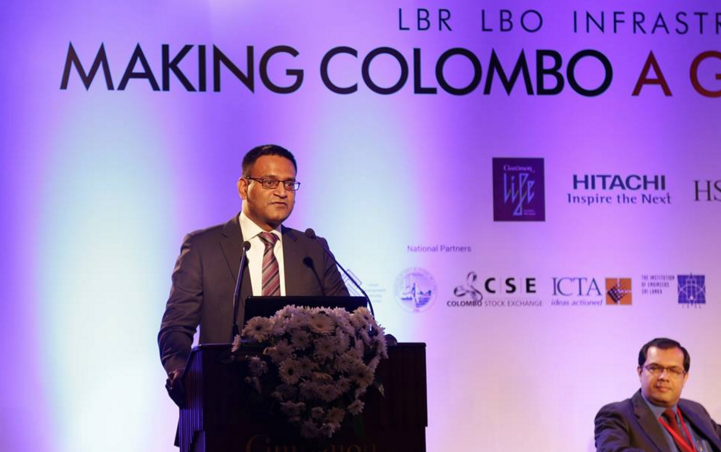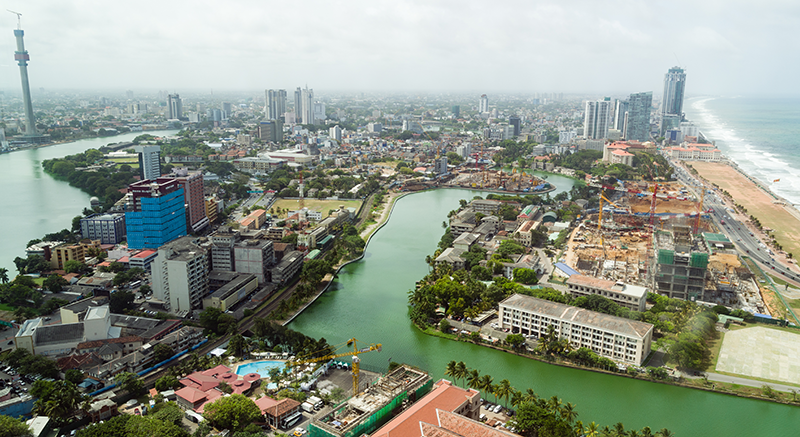This blog post was authored by Vivek Puthucode, General Manager, Public Sector, Microsoft Asia Pacific.
That Sri Lanka is on a path to transform was evident even as I landed at Bandaranayke International airport in Colombo. The cab driver who picked me up from the airport greeted me with a wide smile and handed me the Wi-Fi ID and password for me to use. I was there to attend two key events that represented the shape of things to come in Sri Lanka: the first conference organized by its Computer Emergency Readiness Team (CERT), a key agency responsible for Cyber Security; second, a summit on the theme of “Making Colombo a Globally Competitive City”. These two events are perhaps a reflection of the mindset in Sri Lanka today – inclusive growth through building out a smart digital infrastructure across the island nation and re-igniting the Colombo megapolis to be a world class urban development.
Securing the Future amid Digital Transformation
A new government at the helm is keen to get the country back on the growth path and make that process inclusive. One key aspect of being able to deliver reform, better public services and inclusive growth is to be able to have an agile, modern public sector that is in tune with citizen’s aspirations and needs.
Speaking at the Cyber Security Week organized by CERT Sri Lanka, Eran Wickramaratne, Deputy Minister for Public Enterprises, outlined a vision of a modern public sector that embraces technology. This would help with better policy and decision-making through the leveraging of information, modernizing of service delivery and better intra-government collaboration. However, the minister was quick to point out that cyber security was a critical fundamental in order to uphold data integrity and privacy, as well as national security. One of the key focuses by the government is rolling out fast reliable connectivity to all parts of the country. A feature of such connectivity would be for any citizen to access government services from anywhere and to utilize internet connectivity within 200 meters of a government office building. Once reliable connectivity is established, the potential for people across the island to access planned digital government services, would make it economically meaningful, socially inclusive and create more opportunities for the commercial sector, particularly the small and medium enterprises.
As the country gets digital connectivity like never before and as trade and social exchanges grow in the virtual world, the need to get cyber security policy and implementation right cannot be overstated. People will not use technology they don’t trust. The time is right for ensuring Sri Lanka builds on trust by focusing on security, privacy, compliance and transparency aspects of technology adoption. Key activities such as financial payments, social services, education, healthcare, public safety and intellectual property of local businesses would all rely on the technology backbone that’s being created and it is essential for the government to ensure cybersecurity is right and center of both thinking and doing.
In the absence of a sound cybersecurity policy and implementation, the impact of breaches and attacks can be catastrophic for Sri Lanka and its efforts to build an image and reputation as a place to do business.
Foundations for Physical Infrastructure
The challenge is not just about digital connectivity, it is also about physical connectivity and the discussions at the second event made it abundantly clear.
Colombo is the commercial and cultural heart of Sri Lanka and is at interesting cross-roads today. Known for its clean streets, green cover and beautiful coastline, beneath that surface though, the discussions at the LBR LBO Infrastructure Summit 2015 drove home clearly some fundamental issues that cities like Colombo face.
Public transportation is a critical area, which can impact economic growth, and reduces quality of life, it turns the city into a home for the rich elite while pushing the urban middle class to the fringes. The debate as to whether a mass rapid transport train line like in Singapore, busways like in Brazil or combination of multi-modal transport is right are matters of great public interest. There is an opportunity for the Sri Lankan government to use data and analytics to inform themselves of policy choices, leverage social media to make it inclusive by asking people to provide inputs and ultimately design a people-centric transport system. It is becoming increasingly clear that irrespective of the choice of the transport system, managing passenger expectations and delivering great user experience are vital to the success of transport projects.
Whilst there are fundamental physical infrastructure issues that need attention, the importance of soft infrastructure in helping build a world class city cannot be overstated. There is an opportunity for the two large initiatives to support each other – building national digital infrastructure can help Colombo and re-imagining it as a world class city can help bring inclusive economic growth for the country.

Bringing them together
There are perhaps three lessons that Sri Lanka could learn from other similar experiences around the world in the journey of transformation.
- Innovation Mindset: As cities compete on a global scale for resources including investments and talents, innovation culture is critical for success for Colombo. With the digital infrastructure being rolled out, Colombo could create an innovation eco-system that brings together the best and brightest of minds, technology, government and academia to solve current and future challenges of the island nation. Singapore as an example, has envisioned a ‘Smart Nation’ and is putting in place the ingredients of a thriving eco-system of innovation through various hubs around Singapore. A similar eco-system would play to the strength of Sri Lanka – attractive demography of workforce, skills, English as a working language and a great environment to work and invest for foreigners. New economic activities such as professional services, Business process outsourcing (BPO), Data Analytics and so on can create the next wave of high value employment and participation. This is an important consideration in re-imagining the Megapolis design in terms of work places, universities and where people live.
- People Centric Services: The government of Sri Lanka has the unique once in a generation opportunity to reimagine the service delivery processes to make it people centric. By moving from a brick and mortar dependent infrastructure of governments to digital services, government agencies can pivot around the needs of individual citizens. Open data initiatives can be leveraged to provide citizen centric services and enhance the livability aspect. Examples such as Transport for London demonstrates how people centric service using ICT can positively impact mobility of people and the overall experience of the city. National digital identity services can make access to governments easier and inclusive. With the core infrastructure of connectivity and identity in place, services can be on-boarded based on economic and social impact potential through delivering services on-line. Cost avoidance, reduction of duplication and efficiency gains in government services can be redirected as funds to more pressing government programs.
- Securing Trust: As governments and business go on-line, it is important to ensure trust is built into the services. Trust is built in when the digital infrastructure is secure by ensuring security of data. Privacy is another key element of trust as it is important for citizens to know their privacy is guaranteed through strict policies and implementation. The onus of compliance to security and privacy policies is ultimately on the organization responsible for the delivery of a service and therefore it is critical to make the right choice when it comes to technology partners. The government’s role in leading the policy and standards development can be better supported by seeking inputs from technology partners and including good practices already developed around the world rather than reinventing.






